NCERT Solutions for Class 6 Social Science Civics Chapter 6 Rural Administration are part of NCERT Solutions for Class 6 Social Science. Here we have given NCERT Solutions for Class 6 Social Science Civics Chapter 6 Rural Administration.
| Board | CBSE |
| Textbook | NCERT |
| Class | Class 6 |
| Subject | Social Science Civics |
| Chapter | Chapter 6 |
| Chapter Name | Rural Administration |
| Number of Questions Solved | 16 |
| Category | NCERT Solutions |
NCERT Solutions for Class 6 Social Science Civics Chapter 6 Rural Administration
NCERT TEXTBOOK QUESTIONS (Page 56)
Question 1.
What is the work of the police?
Answer:
- It is the responsibility of the police to register all cases of theft, accident, injury, fight, etc.
- The police have to investigate and take action on the cases within its area.
Question 2.
List two things that the work of a Patwari includes:
Answer:
Works of a Patwari (Any two):
- To measure land
- To maintain and update records of land 0 To collect revenue (Lagaan)
Question 3.
What is the work of a tehsildar?
Answer:
The tehsildars are the revenue officers working under the District Collector. The work of the tehsildar is
- To hear disputes regarding land.
- To supervise the work of the Patwari and ensure that records are properly kept and land revenue is collected.
- To make sure that farmers cm easily obtain a copy of their record.
- Students can obtain their caste certificates from him.
Question 4.
What issue is the poem trying to raise? Do you think this is an important issue? Why?
Answer:
- The poem is trying to raise the issue of inheritance of daughters and mothers in the property of their father/husband.
- I think this issue is an important issue as daughters after marriage are harassed for more dowry and money as they do not inherit a share in’ the property of their father or husband.
- If they inherit their father’s property they can do enough to meet both ends.
- No inlaws’ family would harass them for dowry if they inherit a share in the property of their husband.
Question 5.
In what ways are the work of the Panchayat, that you read about in the previous chapter and the work of the Patwari related to each other?
Answer:
The Patwari keeps a record of ownership of land, location, size, and other facilities. He also has to keep a copy in the office of the Panchayat for easy accessibility and no one can tamper with the records.
Question 6.
Visit a police station and find out the work that the police have to do to prevent crime and maintain law and order in their area especially during festivals, public meetings etc.
Answer:
The police do the following to prevent crime and maintain law and order in their area especially during festivals, public meetings etc.
- They deploy an additional Police force.
- They increase vigil.
- They deploy quick communication techniques.
- They increase search work.
- They increase surveillance.
Question 7.
Who is in charge of all the police stations in a district? Find out.
Answer:
The Deputy Commissioner or the District Magistrate is in charge of all the police stations in a district. He is normally an officer from the Indian Administrative Service.
Question 8.
How do women benefit under the new law?
Answer:
Under the new law, women are benefited in the way that they inherit the property of their father equally with their brothers and mother.
Question 9.
In your neighbourhood are there women who own property? How did they acquire it?
Answer:
The property can be acquired in the following ways:
- A person can buy property from his own earnings. If the woman is employed and has saved enough, she can buy her own property.
- A woman can get a share in the property, after the death of her husband.
- A woman can inherit property, after the death of the father or the mother, if they have not left any SvilP or stating how the property is to be divided between the sons and daughters.
INTEXT QUESTIONS
Question 1.
A Quarrel in the Village:
Mohan is a farmer. His family owns a small agricultural field, which they have been farming for many years. Next to his field is Raghu’s land which is separated from his by a small boundary called a bund.
One morning Mohan noticed that Raghu had shifted the bund by a few feet. By doing so, he had managed to take over some of Mohan’s land and increased the size of his own field. Mohan was angry but also a little frightened. Raghu’s family-owned many fields and besides, his uncle was also the Sarpanch of the village. But even so, he plucked up courage and went ” to Raghu’s house.
A heated argument followed. Raghu refused to accept that he had moved the bund. He called one of his helpers and they began shouting at Mohan and beating him up. The neighbours heard the commotion and rushed to the spot where Mohan was being beaten up. They took him away.
He was badly hurt on his head r and hand. He was given first aid by one of his neighbors. His friend, who also ran the village post-office, suggested that they go to the local police station and file a report. Others were doubtful if this was a good idea because they felt they would waste a lot of money and nothing would come out of it. Some people said that Raghu’s family would have already contacted the police station.
After much discussion, it was decided that Mohan would go to the police station along with some of the neighbours who had seen the incident.
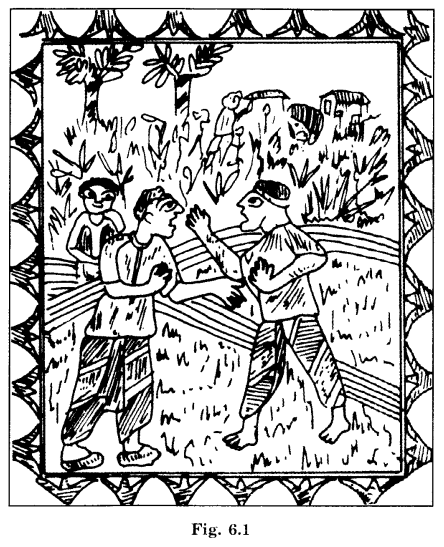
Area of the Police Station:
On the way to the police station, one of the neighbours asked, “Why don’t we spend some more money and go to the main police station in the town?”
“It is not a question of money. We can register the case only in this police station because our village comes in its area of work,” explained Mohan.
Every police station has an area that comes under its control. All persons in that area can report cases or inform the police about any theft, accident, injury, fight, etc. It is the responsibility of the police of that station to enquire, investigate and take action on the cases within its area.
Question Box: (NCERT Page 49-50)
- If there is a theft in your house which police station would you go to to register your complaint?
- What was the dispute between Mohan and Raghu?
- Why was Mohan worried about picking a quarrel with Raghu?
- Some people said Mohan should report the matter to the police and others said he should not. What were the arguments they gave?
Answer:
- If there is a theft in our house we would go to the police station in our area to register our complaint.
- The dispute between Mohan and Raghu was that Raghu had shifted the bund of his agricultural field by a few feet into the fields of Mohan.
- Mohan was worried about picking a quarrel with Raghu because of the following reasons:
- Raghu was a big landlord, as his family-owned many agricultural fields.
- He had resources at his disposal.
- His uncle was the sarpanch of the village.
- The arguments are given by the people:
- He should report to the police
- The police would help him to force Raghu to retrace the bund.
- It would scold him.
- It would also send him to jail if he resists.
- He should not report to the police:
- He would waste a lot of money.
- Nothing would come out of it.
- Raghu would have already contacted the police and it would scold Mohan.
- He should report to the police
Question 2.
When they reached the police station Mohan went to the person-in-charge (Station House Officer or S.H.O.) and told him what had happened. He also said that he wanted to give the complaint in writing. The S.H.O. rudely brushed him aside saying that he couldn’t be bothered to waste his time writing down minor complaints and then investigating them. Mohan showed him his injuries but the S.H.O. did not believe him.
Mohan was puzzled and did not know what to do. He was not sure why his complaint was not being recorded. He went and called his neighbours into the office.
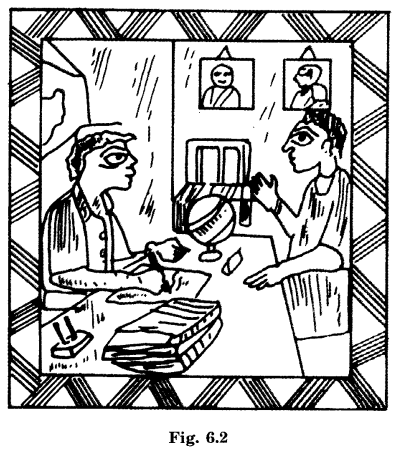
They argued strongly that Mohan had been beaten up in front of them and had they not rescued him he would have been injured very seriously. They insisted that the case be registered. Finally, the officer agreed. He asked Mohan to write down his complaint and also told the people that he would send a constable the next day to investigate the incident.
Question Box: (NCERT Page 50)
(i) Show the above situation in the police station through a skit.
(ii) Then talk about how you felt playing Mohan’s role or that of the S.H.O. or the neighbours.
(iii) Could the S.H.O. have handled the situation differently?
Answer:
(i) Please see the skit in the story.
(ii) I felt very Sorry for playing Mohan’s role, as no one in the police station helped me initially.
The S.H.O.’s role, in the beginning, was very disappointing. He should have behaved in a gentleman’s tone. He should have tackled the situation in a very judicious manner.
The neighbours instead of going to the police station should have gone to Raghu or the Village Panchayat to dissuade Raghu from giving back the portion of land to Mohan.
(iii) The S.H.O. could have handled the situation differently.
- He could have listened to Mohan patiently.
- He could have sent Raghu to the Police station.
- He could have dissuaded Raghu to retrace his decision.
- He could have scolded Raghu without any fear or pressure.
Question 3.
You saw that Mohan and Raghu were arguing heatedly whether the common boundary of their fields had been shifted. Isn’t there a way by which they could have settled this dispute in a peaceful manner? Are there records that show who owns what land in the village? Let’s find out how this is done. (NCERT Page 51)
Answer:
- Yes, there is a way by which they could have settled this dispute in a peaceful manner:
- Mohan should have gone to Patwari first and got the fields measured.
- Mohan should have gone to the village panchayat.
- The Panchayat would have discussed the matter with Mohan and Raghu.
- The village members would have dissuaded Raghu and he would have retraced his step.
- He would have given back the occupied portion of land to Mohan.
- Yes, there are records that show who owns what land in the village. They are called land revenue records. They remain with the village Patwari.
- How land records are kept is given below:
- Patwari is an officer who measures the land and keeps the land records.
- Patwari is called by different names in different states:
- Patwari
- Lekhpal
- Kanungo
- Karmachari
- Village Officer
- Patwari maintains and updates the land records:
- he uses a long chain for measuring land.
- he also collects revenue (Lagaan or rent).
- he also informs the government about crops grown in his area.
Question 4.
Question Box: (NCERT Page 51)
(i) Find out the term used for the Patwari in your state:
(ii) If you live in a rural area, find out
(a) How many villages do the Patwari of your area maintain land records of?
(b) How do people in the village contact him/her?
Answer:
(i) Patwari in Delhi: (Lekhpal in U.P.). in)
(ii) (a) A group of villages.
(b) The Patwari fixes the days in each village. Usually, Panchayat President’s office is his office. People can contact him in this office.
Question 5.
The Khasra record of the Patwari gives you information regarding the map given below. It identifies which plot of land is owned by whom. Look at both the records and the map and answer the questions given below regarding Mohan and Raghu’s land.
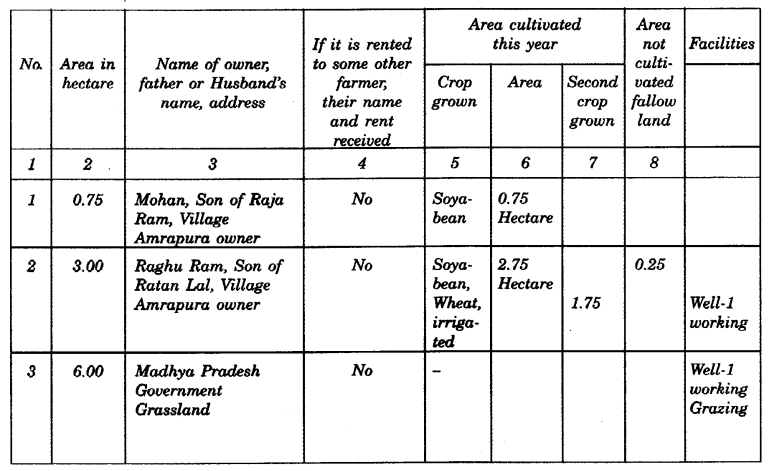
(See Fig. 6.3 on next page)
- Who owns the land south of Mohan’s field?
- Mark the common boundary between Mohan’s and Raghu’s lands.
- Who can use field no.3?
- What information can one get for field no. 2 and field no. 3? (NCERT Page 52)
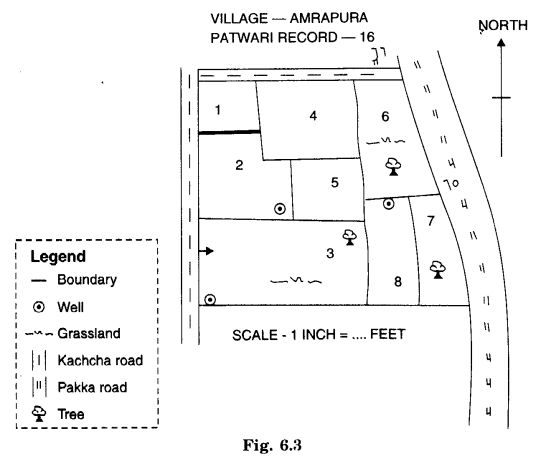
Answer:
- Raghu.
- The common boundary between Mohan’s and Raghu’s lands has been marked with a thick line.
- No one except M.R Government.
- Field No. 2
- Raghu’s land.
- Crops grew—Soyabean, wheat.
- Irrigated land.
- Area 2.75 hectare
- The second crop is grown on 1.75 hectare
- Fallow land 0.25 hectare
- Well, 1-working.
- Field No. 3
- M.P. Government grassland
- Not on rent
- One well-working
- Used for grazing cattle.
Question 6.
When do you think farmers may require a copy of this record? Study the following situations and identify the cases in which these records would be necessary and why.
- A farmer wants to buy a plot of land from .another.
- A farmer wants to sell her produce to another.
- A farmer wants a loan from the bank to dig a well in her land.
- A farmer wants to purchase fertilizers for his field.
- A farmer wants to divide his property among his children.
Answer:
- Farmers may require a copy of this (land) record
- When they want to sell their land.
- When they give it on partnership.
- When they get crops raised on it.
- When they want to divide it among their heirs.
- When a farmer wants to buy a plot of land from another, he has to get his name entered in the revenue records after it has been registered in his name.
- Not required.
- The farmer will put the papers as mortgaged with the bank.
- Not required.
- He will require the records for dividing the land among his children and register the plots in their name as per divisions.
Question 7.
Other Public Services- A survey
This chapter has looked at some of the administrative work of the government, especially for rural areas. The first example related to maintaining law and order and the second to maintaining land records. In the first case, we examined the role of the police and in the second that of the Patwari. This work is supervised by other people in the department, such as the Tehsildar or the Superintendent of Police. We have also seen how people use these services and some of the problems that they face. These services have to be used and made to function according to the laws that have been framed for them. You have probably seen many other public services and facilities provided by various departments of the government.
Do the following exercise for your village/by visiting a nearby village or looking at your own area.
List the public services in the village/area such as the milk society, the fair price shop, the bank, the police station, the agricultural society for seeds and fertilizer, the post office or sub-post office, the Anganwadi, creche, government school/s, health centre or government hospital, etc. Collect information on three public services and discuss with your teacher how improvements can be made in their functioning. One example has been worked out. (NCERT Page 54)
Answer:
Public services in the village:
- Bank
- Milk Society
- Post Office
- Health Centre
- Fair Price Shop
- Govt. School
- Creche
- Govt. Hospital
- Milk Booth
- Vegetable Booth.
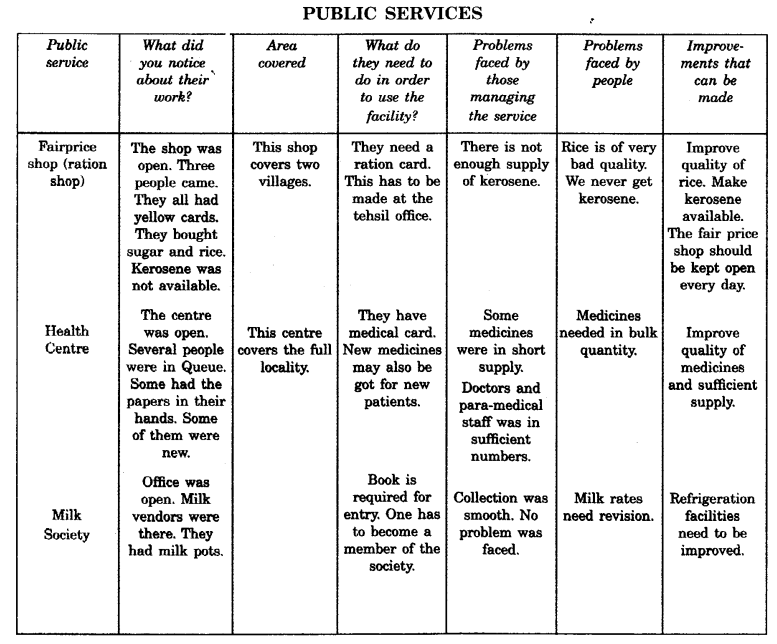
We hope the NCERT Solutions for Class 6 Social Science Civics Chapter 6 Rural Administration help you. If you have any query regarding NCERT Solutions for Class 6 Social Science Civics Chapter 6 Rural Administration, drop a comment below and we will get back to you at the earliest.